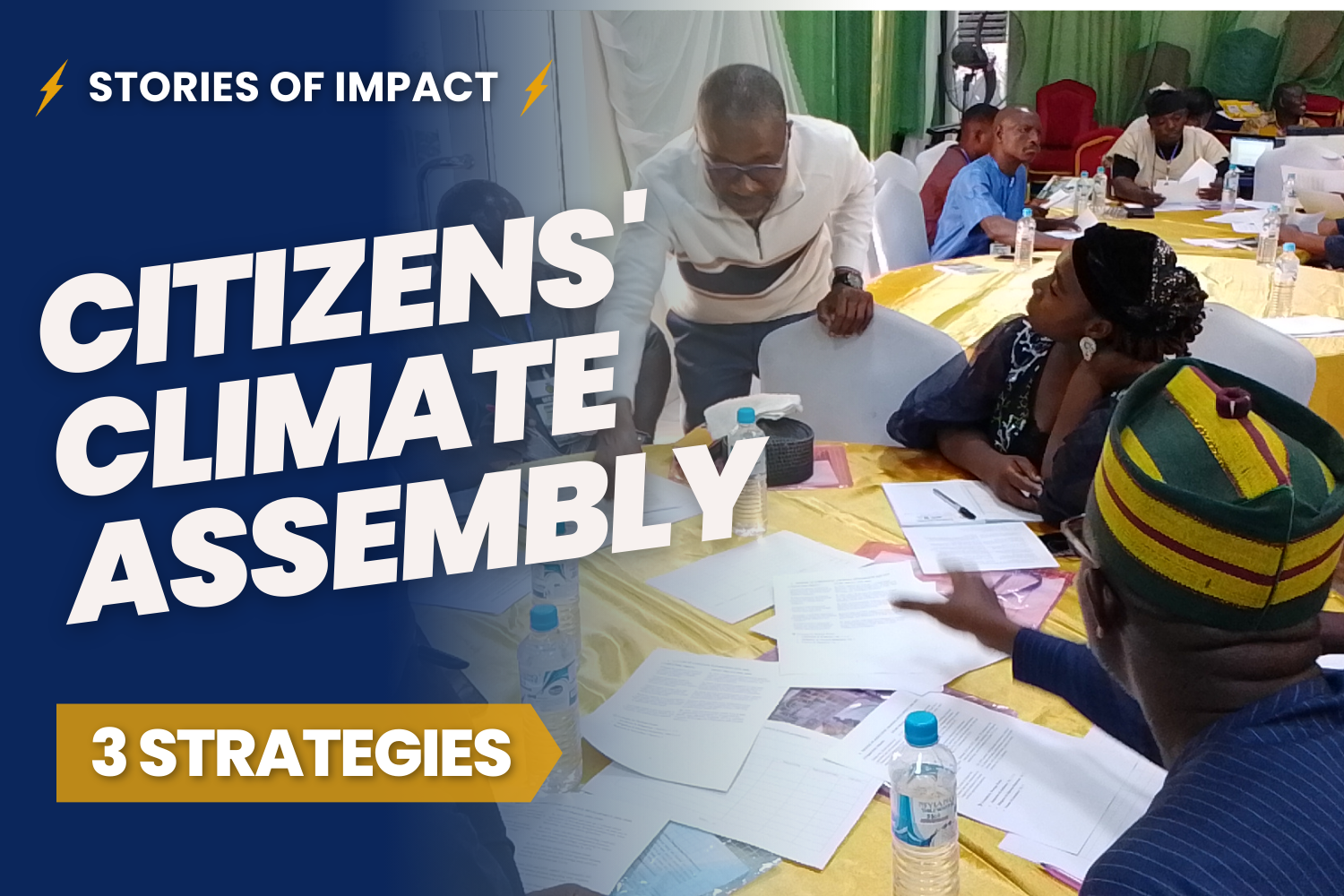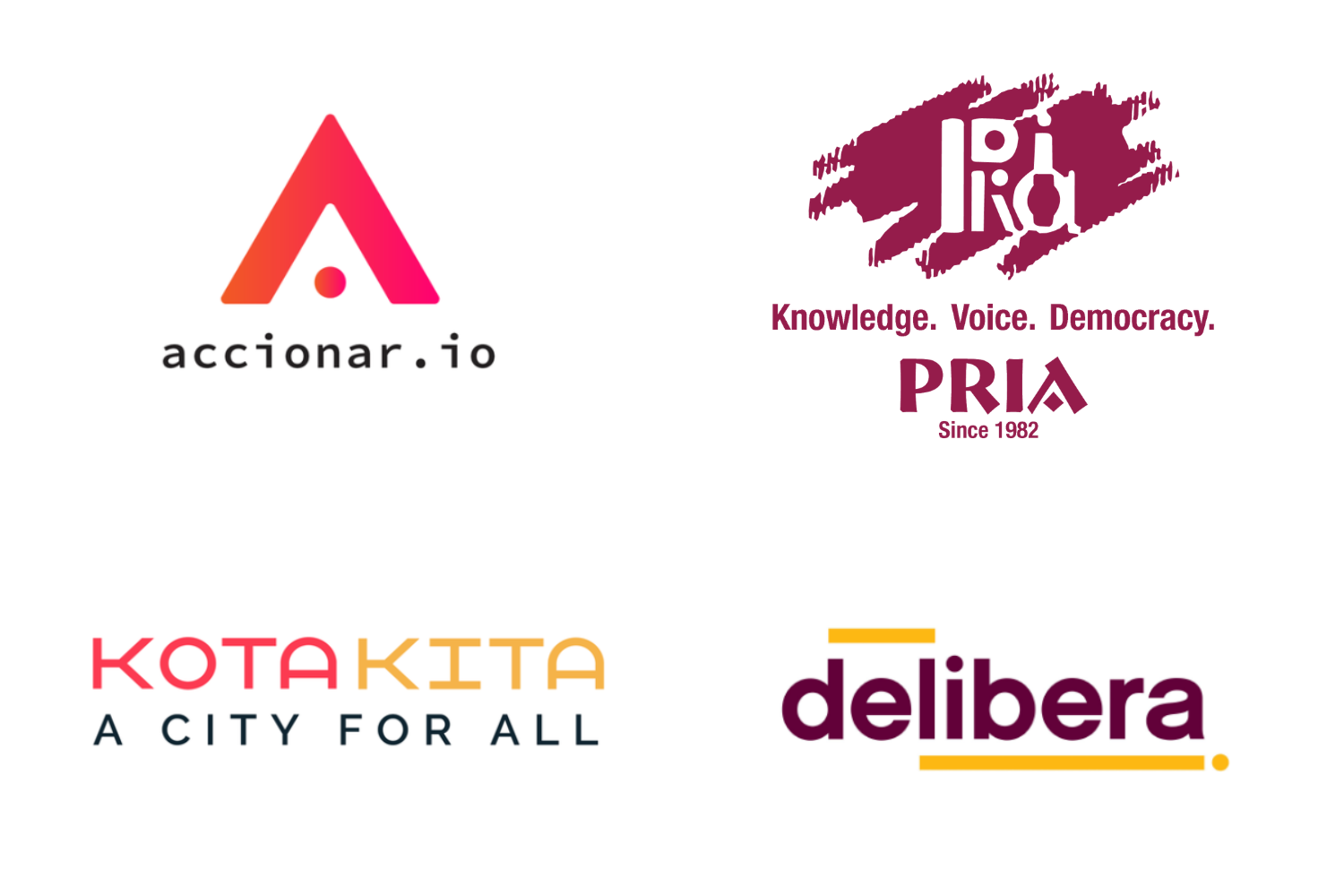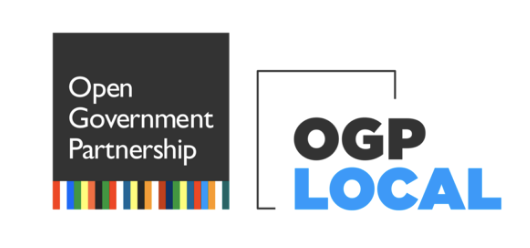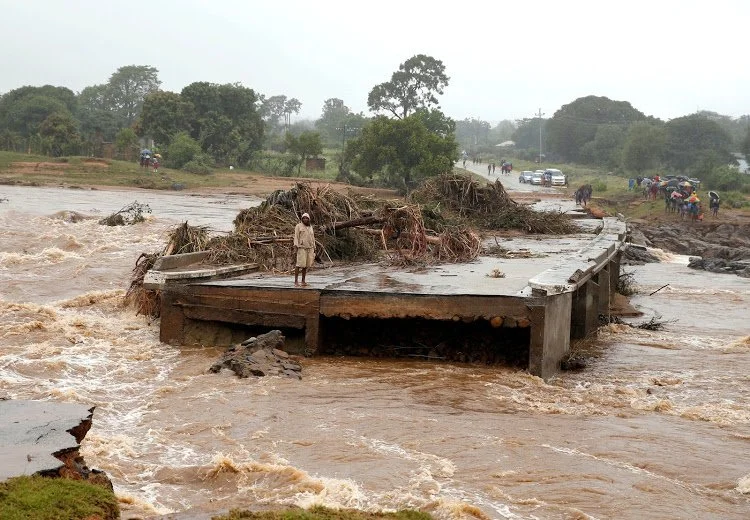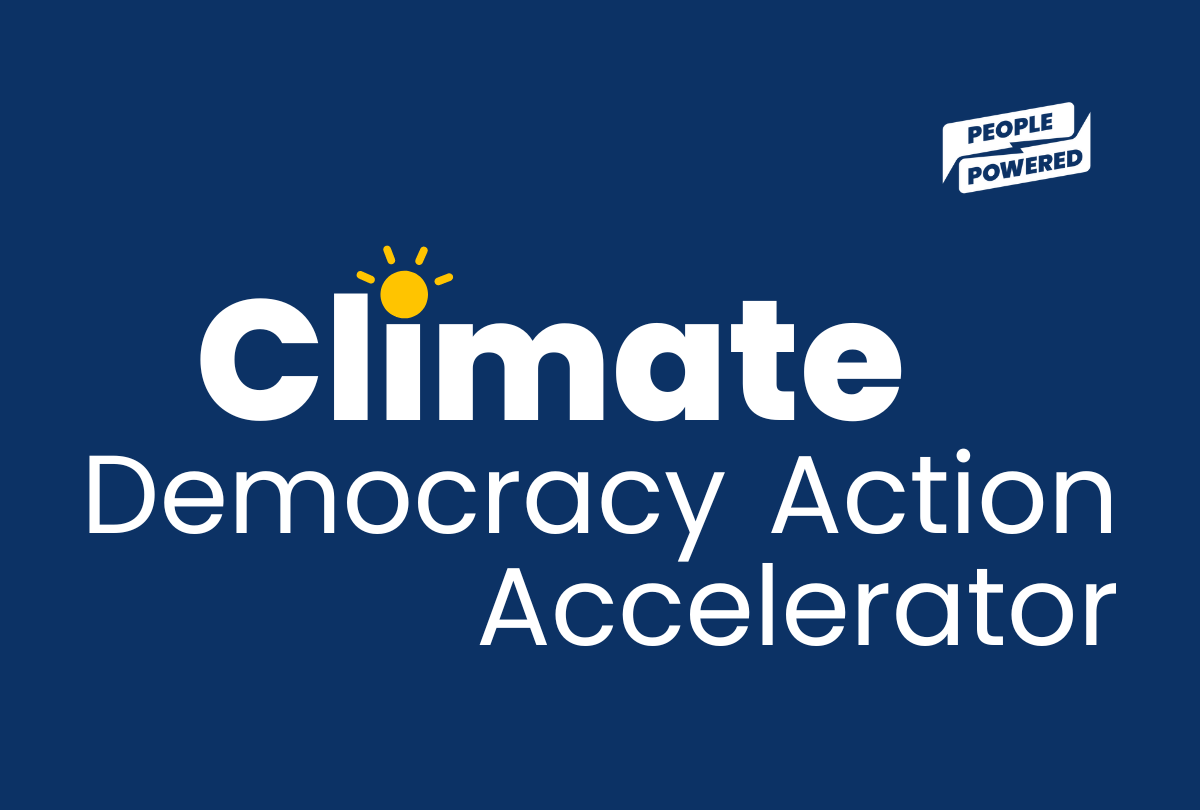Climate change is a global issue affecting every aspect of our modern society, from declining agricultural productivity, rising sea levels, drought, forest fires and catastrophic flooding. To tackle the climate crisis, governments have a mandate to enable and encourage citizens, civil society, activists and more to participate in shaping and implementing climate policies. By expanding public participation and bringing marginalized voices into decision-making, governments can create climate-focused policies that prioritize renewable energy and regenerative agriculture, ensuring solutions are equitable and responsive to community needs.
People Powered is seeking government and civil society leaders to join a new cohort of innovators who want to launch participatory programs that shape climate policy, with a focus on regenerative agriculture, renewable energy, and just transitions.
To be selected for this program, applicants must be from governmental institutions, civil society organizations or non-governmental organizations. The program prioritizes applicants from the five priority countries (Brazil, Indonesia, India, Mexico, South Africa), with additional spots available for participants from other countries around the world.
The Climate Democracy Accelerator (CDA) is a six-month, practice-oriented training and support program that prepares members to plan and implement an inclusive and participatory process for a just climate transition. Participants will develop a project to implement a participatory program focused on regenerative agriculture, renewable energy, and climate solutions that address the needs and voices of local communities. Selected applicants will have access to a dedicated mentor to guide the development of their program, along with:
Step-by-step resources including the Participation Playbook, our interactive, online tool for designing participatory programs.
Practice-oriented live sessions, online courses and workshops.
Participation in a country-based peer group, facilitated by the in-country lead partner, for guidance, feedback, and collaboration.
Localized case studies and resources relevant to participants’ country contexts.
A $10,000 USD implementation grant for all participants.
The top five action plans in each cohort will receive an additional $15,000 award.
Climate Action Impacts
The Climate Democracy Accelerator has launched over 50 climate action and citizen engagement programs around the world since its inception in 2023. Learn more about the success stories!
Learn about current and past CDA participants
What is the application process?
Read through the program requirements and selection criteria below.
Complete the application form and submit the required documents by December 8, 2025, 5:00 pm UTC (check your timezone here). Applications for this cycle have now closed.
Program timeline:
October 7–December 8, 2025: Application period.
December 2025: Selection process
January 2026: Selected participants are notified.
February–March 2026: Due diligence and onboarding.
March 2026: Program begins.
August 2026: Program ends.
August–September 2026: Participants share learnings.
September 2026–August 2027: Participants implement their action plan.
Program timeline.
More application details
Government officials, staff members and policymakers who want to launch a participatory program for making just climate-related decisions. Please note: Government institutions applying must have a partnership with a civil society organization/non-governmental organization, as the grant recipient must be a non-governmental entity.
Civil society organization staff members and/or climate advocates who want to implement a participatory program focused on climate in partnership with a government institution. Please note: Civil society organizations applying must work in partnership with a government institution, as they must follow up with the implementation of the action plan.
Organizations should nominate a lead participant with professional proficiency in at least one of the following languages: English, French, Portuguese or Spanish. The program prioritizes applicants from the five priority countries: Brazil, Indonesia, India, Mexico, and South Africa, with additional spots available for participants from other countries. People Powered or Open Government Partnership members will also be prioritized.
Please note that the CDA selection is a very competitive process. We only accept programs with a focus on regenerative agriculture and renewable energy. We prioritize applicants who can clearly demonstrate that the program's training and support will concretely address their capacity-building needs.
Note: Former CDA participants who want to be considered for a new program cohort should not be in their grant implementation period and should present strong evidence of the additional capacity-building they need from the same training.
People Powered cannot give funds to volunteer groups or recently incorporated civil society organizations through this program. To receive funding, your organization needs to:
Demonstrate at least one full year of operations and successful fundraising to support such operations before being short-listed for the program.
Have paid staff and a board of directors or advisory committee.
Be registered as a non-profit organization in the country of operations.
Successful applicants will receive a $10,000 USD implementation grant at the end of this program. To receive this grant, the conditions below apply. Please review these requirements and make sure you will be able to provide this information. The below applies to civil society organizations only, as they will be the recipients of the funding. Government institutions applying for the CDA program must ensure that their civil society partner meets the below eligibility requirements.
Provide financial statements or audited accounts for your organization. We usually only ask for 12 to 24 months of financial statements (for example, your current fiscal year and your previous fiscal year).
Provide evidence of your organization’s charitable or non-profit status. For example, your legal registration form or articles of association (also called ‘bylaws’).
Complete a tax form that People Powered needs to provide for its own tax purposes as an organization making grants to others. We will send this to you for completion as part of due diligence.
Have a valid organizational bank account and be able to provide your bank information to People Powered in order to receive the grant.
If you are a government body or organization, we will ask for a Memorandum of Understanding (MoU) with the civil society partner who will receive the grant.
Once participants complete the program requirements, they will receive $10,000 USD in funding support.
This CDA cohort will consist of 30 government and civil society leaders. It will start in March 2026 and end in August 2026. In this cohort:
Participants can expect to spend an average of two to three hours per week from March to August 2026 for the duration of the training program and mentoring support.
Participants will also be asked to set aside a few key dates on their calendars to participate in the program’s live Zoom sessions and workshops held by in-country lead partners.
After the completion of the training, participants will have 12 months to implement their action plan with the $10,000 USD funding received. The amount of time you spend on your project will depend on the action plan you have developed.
Develop an action plan (project) to be implemented, with the support of the program resources.
Engage internal and external stakeholders to develop the action plan.
Attend and participate in dedicated training and mentorship/peer support activities and discussions.
Report on project progress through surveys and learning reports.
Engage with other cohort members to support each other’s work.
The application form contains the following questions:
In no more than 200 words, please describe your proposal for a participatory or deliberative project to address a climate challenge related to renewable energy or regenerative agriculture.
In no more than 150 words, please describe the specific climate challenge in your chosen area (renewable energy or regenerative agriculture) you want to address in your community or country.
In no more than 250 words, how will your participatory or deliberative project support a just transition in your context? How will you engage marginalized or excluded communities in this work?
A just transition refers to a future in which the worst impacts of the climate crisis are mitigated, communities have adaptive capacity, and the effects of the climate crisis are more equitably distributed. Marginalized groups or communities can include climate-vulnerable populations, immigrants, refugees, disabled people, religious minorities, ethnic and racial minorities, youth and children, elderly people, women, and LGBTQ+ people, among others.
In 100 words, describe one key experience that demonstrates how you have worked in partnership to deliver a participatory or deliberative program to address a climate challenge. If you haven’t had experience with this, please provide one example of a climate program you have delivered and/or a partnership you have worked in successfully.
In 100 words, what will you try to accomplish by participating in the CDA program? Share how the program support and grant will help your organization to achieve your goals. Please be as specific as possible.
Is there any specific support you will need from the program or any additional information you would like to add?
Learn more about our CDA In-Country Lead Partners
Accionar.io
Mexico City, Mexico
Accionar.io is a democratic innovation laboratory for accelerating change processes. Through campaign design and technological tools, it strengthens the capacities of activists, groups, and movements seeking to expand the exercise of rights for historically excluded groups and promote participatory democracy in Mexico.
Participatory Research in Asia (PRIA)
New Delhi, India
Founded in 1982, PRIA is a global center for participatory research and training. For over four decades, it has empowered citizens—especially marginalized communities—through information and mobilization, while also sensitizing government agencies to citizen needs. PRIA works with governments, civil society, and the private sector to improve service delivery, strengthen democratic practices, and shape inclusive policies.
Kota Kita
Solo, Indonesia
Kota Kita is a non-profit organization based in the Indonesian city of Surakarta (Solo), Indonesia, with expertise in urban planning and citizen participation in shaping inclusive cities. Kota Kita bridges dialogue between governments and citizens by facilitating participation and collaboration, influencing urban policies, promoting open access to information, and providing civic education to empower communities toward building a City for All."]
Delibera Brasil
São Paulo, Brazil
Delibera Brasil is a non-profit and non-partisan organization that aims to contribute to the strengthening and deepening of Brazilian democracy, promoting citizen deliberation, an action methodology known as mini-publics or citizens' assemblies.
Note: The African partner will be announced soon.
International Partners
The Climate Democracy Accelerator is made possible thanks to support from the Waverley Street Foundation.





